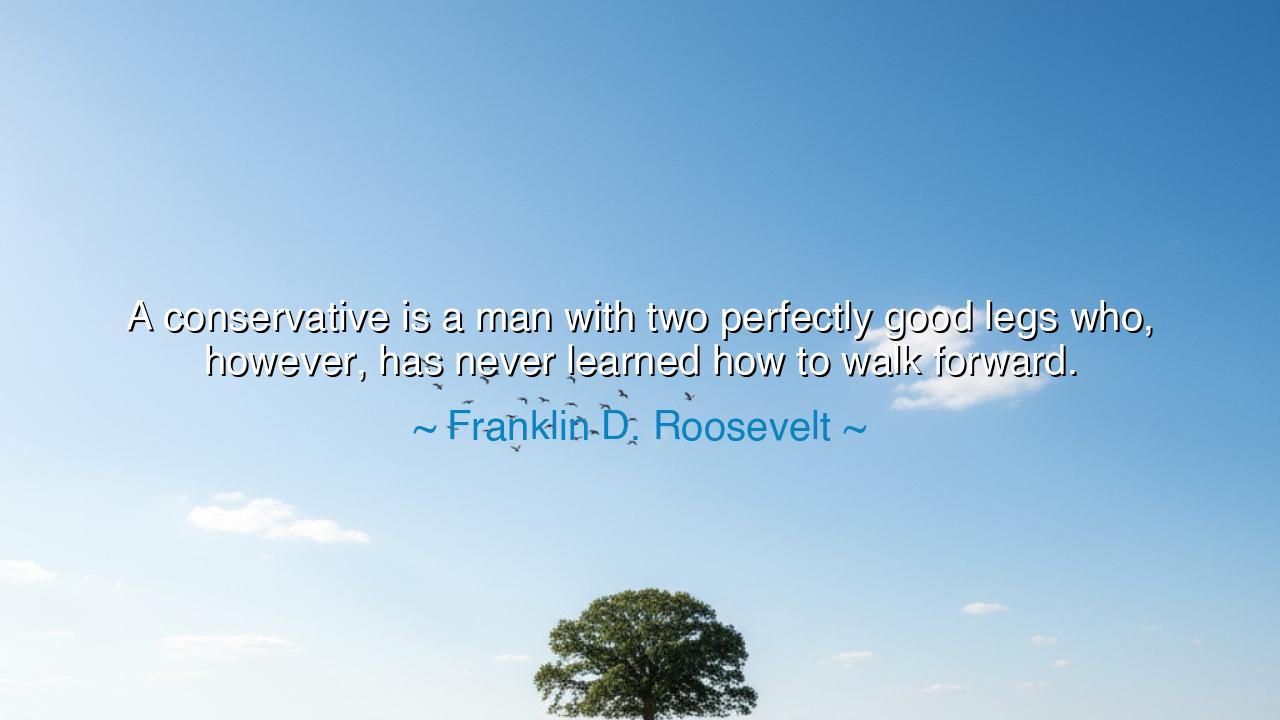
A conservative is a man with two perfectly good legs who
A conservative is a man with two perfectly good legs who, however, has never learned how to walk forward.






The words of Franklin D. Roosevelt — “A conservative is a man with two perfectly good legs who, however, has never learned how to walk forward.” — strike with the clarity of both wit and vision. Beneath the humor lies a challenge to the spirit of complacency. Roosevelt, a leader who bore the weight of Depression and war, proclaimed that to cling only to what is safe and familiar, while refusing to step boldly into the unknown, is to waste the strength one already possesses.
The meaning is profound: a conservative, in Roosevelt’s image, is not without ability, not crippled or weak, but simply unwilling to move into the future. He may have “two perfectly good legs” — resources, opportunities, even wisdom — but he chooses stillness over progress. Thus the quote becomes not only a critique of politics, but a parable of life itself: to live is to move, and to move is to grow. To refuse to walk forward is to betray the very gifts one has been given.
History bears witness to this truth in Roosevelt’s own time. During the Great Depression, many counseled caution, urging the nation to wait, to endure, and to hold fast to tradition. Yet Roosevelt, through the New Deal, pressed forward with bold reforms — social security, public works, labor protections. Critics decried him as reckless, but it was his willingness to “walk forward” that restored faith and gave millions the chance to rebuild their lives. Had he listened only to the immovable voices of conservatism, America might have remained paralyzed in despair.
But the wisdom here is not to despise caution, only to recognize its limits. Conservatism has its place in preserving foundations, yet without the courage to step beyond, it becomes a cage. The man who will not move, though he has strong legs, is no freer than the man who cannot move at all. Progress, reform, and forward vision are the lifeblood of any people, and to deny them is to wither slowly while life marches on without you.
Let this truth be carried into the hearts of generations: strength unused is strength wasted, and the future does not belong to those who stand still. The call of Roosevelt’s words is not merely political but human — rise, and walk forward. For the world is remade not by those who cling to the past alone, but by those who dare to step into tomorrow, guided by courage, vision, and faith in what may yet be.






NTThach Thi Ngoc Thuy
Roosevelt's quote brings to light the tension between progress and tradition. I wonder, though, is it always wrong to hesitate and think carefully before moving forward? There’s wisdom in taking a step back to analyze the consequences of change. But how do we know when we are holding back for the right reasons, versus when we're simply afraid of what lies ahead? Can there be a middle ground between embracing change and respecting the past?
BAPhan Tran Bao Anh
This quote strikes me as a sharp critique of conservatism, but what if the 'forward' being referenced isn't necessarily better? Is it possible that the forward momentum society is moving toward isn’t always for the best? Could conservatism be a way of preserving important values, even when society is rushing forward with ideas that may not be as solid as they appear? Maybe the real question is not whether to move forward, but *how* to do so wisely.
PLTran Phuong Linh
Roosevelt’s metaphor seems to paint a rather one-sided view of conservatism. But what if conservatives simply see the ‘forward’ path as one that needs to be carefully evaluated, not just blindly followed? Could their refusal to rush ahead be a sign of wisdom, rather than stagnation? How do we balance the need for progress with the need for reflection, and where do we draw the line between moving forward and moving recklessly?
NVBa Nguyen Van
This quote portrays conservatism as being stagnated, but isn’t it possible that conservatives just have a different vision for progress? Perhaps they believe in advancing through more cautious or incremental steps, rather than leaping forward without consideration. Does this mean that all progress must look the same, or can it come in various forms, depending on the philosophy behind it? Are we too quick to judge a mindset without understanding its core values?
VTvi tien
Roosevelt’s quote seems to suggest that conservatism, or a conservative mindset, is rooted in a reluctance to embrace progress or change. But is this a fair criticism? Could it be that conservatives value stability and tradition in a way that serves society, even if it means resisting rapid change? Is the real problem a fear of change or simply a different approach to progress, one that requires more careful thought?